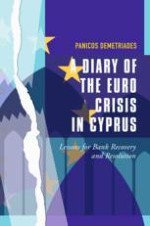2017 | OriginalPaper | Buchkapitel
9. The Euro at Breaking Point
verfasst von : Panicos Demetriades
Erschienen in: A Diary of the Euro Crisis in Cyprus
Aktivieren Sie unsere intelligente Suche, um passende Fachinhalte oder Patente zu finden.
Wählen Sie Textabschnitte aus um mit Künstlicher Intelligenz passenden Patente zu finden. powered by
Markieren Sie Textabschnitte, um KI-gestützt weitere passende Inhalte zu finden. powered by
